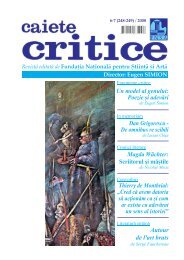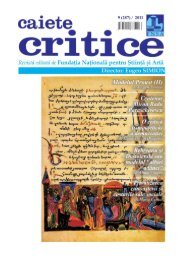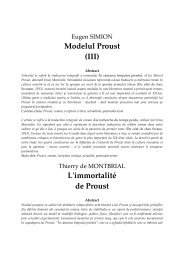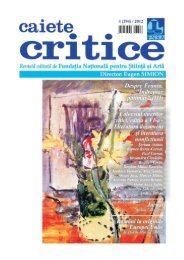Tot despre modelul grec în cultura română: parabole ... - Caiete Critice
Tot despre modelul grec în cultura română: parabole ... - Caiete Critice
Tot despre modelul grec în cultura română: parabole ... - Caiete Critice
Create successful ePaper yourself
Turn your PDF publications into a flip-book with our unique Google optimized e-Paper software.
Romanticism and Chaos Theory<br />
rents). The conclusion of these researches is<br />
that from disordered, turbulent states,<br />
ordered states are born, which again go into<br />
chaotic states from which again new<br />
ordered states are generated, ad infinitum 5 .<br />
The passage from order to disorder is<br />
made by entering a “bifurcation epoch” –<br />
corresponding to the “Übergangszeitalter”<br />
or the age of passage, about which the<br />
romantics speak: now appear the chaotic<br />
attractors 6<br />
(resulting from fluctuations)<br />
which trigger the transition towards disorder.<br />
When systemic stabilization begins, the<br />
so-called “periodic or punctual attractors” 7<br />
appear.<br />
In this respect, Novalis for instance considered<br />
war as being the strongest expression<br />
of turbulence, confusion, chaos, these<br />
being for him also the sign of the age of passage,<br />
“Übergangszeitalter”, towards something<br />
new. His famous hero, Heinrich von<br />
Ofterdingen, must thus become a poet in an<br />
epoch of turbulence precisely because this<br />
affords the possibility that new structures<br />
emerge 8 . In other words, disruptions in the<br />
historical continuum emerge, such that<br />
transitions towards something new become<br />
possible by phenomena of discontinuity, of<br />
“deep transformations” 9 .<br />
The conclusion of chaos theory is that<br />
there is no chaos 10 .<br />
This is the same as saying that: 1) “being<br />
is and can only be” (Parmenides); 2) “since<br />
life cannot be quench’d, Life exuded” 11<br />
(William Blake): here “life” can be read as<br />
“order”: for the romantics order is a sort of<br />
“cascading” phenomenon, which is paradoxically<br />
always descensional-ascensional<br />
and ascensional-descensional, in accordance<br />
with the paradox of indeterminate<br />
determinacy – such as in Spirit, and determined<br />
indeterminacy – such as in animate<br />
matter: in other words, infinite spirit and<br />
finite matter, which form what we call the<br />
paradox of “interfinitude”; 3) close to equilibrium<br />
order tends towards disorder, and<br />
far from equilibrium disorder tends<br />
towards order, up to the moment when the<br />
emergence of an even more complex order<br />
takes place (Glansdorff and Prigogine).<br />
5 Willy Obrist, Archetypen, Natur- und Kulturwissenschaften bestätigen C. G. Jung, 1990, p. 221.<br />
6 See the term also in Ilya Prigogine, Isabelle Stengers, Das Paradox der Zeit – Zeit, Chaos und Quanten, 1993,<br />
p. 114-118.<br />
7 E. Laszlo, The Choice: Evolution or extinction?, 1994, p. 93, apud Ken Wilber, Sex, Ecology, Spirituality, 1995,<br />
p. 75.<br />
8 Ira Kasperowski, Mittelalterrezeption im Werk des Novalis, 1994, p. 218.<br />
9 See Schiller who considered silence, Ruhe, as a condition of culture, Bedingung der Kultur, unlike Novalis,<br />
who considered war as a historical-philosophical category, the exemple that Novalis adopted being the<br />
crusades, his model of the romantic age of passage; in this respect, Roche shows that Schiller’s definition for<br />
idyllic silence is practically similar to Hölderlin’s “living silence”, lebendige Ruhe. Cf. Mark William<br />
Roche, Dynamic Stillness, Philosophical Conceptions of Ruhe in Schiller, Hölderlin, Büchner, and Heine, 1987,<br />
p. 90.<br />
10 Ken Wilber, Sex, Ecology, Spirituality, 1995, p. 75.<br />
11 William Blake, Cãrþile Profetice, Cei Patru Zoa, 1998, VIII, 417, p. 401.<br />
53







